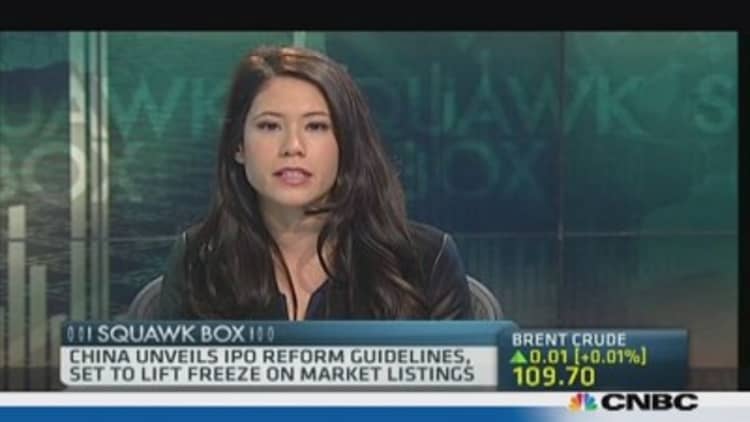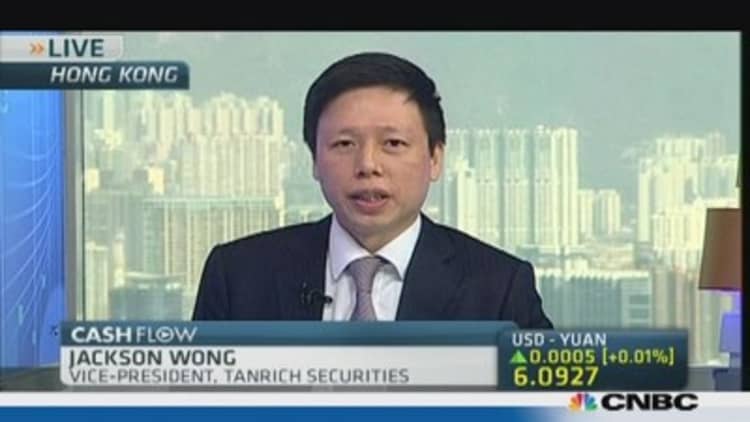
Chinese shares plunged on Monday after regulators issued rules that will allow new listings to resume next year following a more than a year-long freeze, sparking concerns the huge pipeline of new listings could drain liquidity from existing stocks.
Over the weekend, regulators issued the long-awaited rules, which have stricter initial public offering (IPO) disclosure requirements and shorter review times. The China Securities Regulatory Commission froze IPOs in a move to improve scrutiny of stock market hopefuls and increase investor confidence with improved listing procedures.
The Shenzhen index ended down 5.0 percent at 1035.537 Monday, with the small-cap ChiNext hardest hit, ending down more than 8 percent. Shanghai trade was more moderate, with the ending down 0.6 percent at 2207.37.
(Read more: China's IPO freeze may spur wave of asset sales)
"The Shenzhen index is heavily represented by smaller, growth-oriented companies, compared with the main market in Shanghai," noted Louis Kuijs, a China economist for RBS, explaining why the Shenzhen market may be harder hit than Shanghai's. "Small companies are more likely to list in Shenzhen."
Shanghai Composite 5-day chart
While investors have been waiting for the IPO market to unfreeze since regulators suspended new issuance in November of 2012, they are concerned the huge pipeline of companies waiting to go to market will drain liquidity, even as the government has been tightening up its monetary policy.
"There'll be an existing 600 companies that have filed for an IPO and have been waiting for the last two years and there'll be another 800 that will file again," noted Frank Tang, CEO at Fountainvest Partners, at the AVCJ Asian Private Equity and Venture Forum in Hong Kong last month. "Even if China takes two companies' IPOs a day, it'll probably take three years to clear that pipeline up," Tang said.
(Read more: China's early-bird investors are left holding the worm)
The first batch of IPOs are likely to be on Shenzhen's small-to-medium enterprise board ChiNext, Edward Au, co-leader of Deloitte China's national public offering group, told CNBC last month.

While the new regulations are aimed at shifting toward market-driven decisions on when companies list on the exchanges and away from government control, "they may start by managing the process," Kuijs said. "The financial sector is trying to cope with a tighter liquidity situation than eight months ago."
The rules are generally positive, Goldman Sachs said in a note, noting the focus on market-oriented decisions and investor interest as well as promoting a "fundamental value" investment concept via new regulations for paying cash dividends.
(Read more: China's economic reforms: What you need to know)
"Overall, we believe the major beneficiaries are brokers, banks and high/rising-dividend sectors," Goldman said. The market agreed with the financial sectors bucking the overall declines. Citic Securities' Hong Kong-listed shares surged 10.0 percent, while its Shanghai shares tacked on 5.1 percent.
Others also view the new rules as positive in the longer term. "Now that we have more market-oriented guidelines, that means the new IPOs will be more suitable for investors, rather than those IPOs that mainly could be listed because of the connections, or we call it guanxi," Jackson Wong, vice president of Tanrich Securities, told CNBC.
(Read more: China's reform drive threatens to derail yuan)
He also expects the stocks of badly managed companies will face a much tougher outlook ahead amid tougher competition for capital as the fresh IPOs drain market liquidity.
Goldman expects some of the liquidity concerns could be alleviated by the reforms allowing companies to issue preferred shares, as it would diversify funding sources, especially for banks which are seeking to refinance, Goldman Sachs said in a note. But it added, "any potential launch of preferred shares in the near term could dilute some liquidity, mainly from fixed-income focused investors."
—By CNBC.Com's Leslie Shaffer; Follow her on Twitter @LeslieShaffer1

